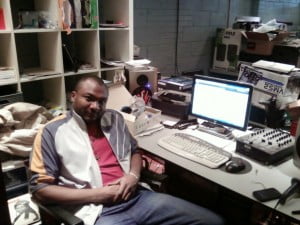The resident IT expert at Play de Record and owner of Studizzy Productions recently sat down with me to talk DJing, music, and life. Born in Oslo, Norway, to Nigerian parents, Iyomahan has been living in Toronto for the past four years, and has produced tracks for the likes of Susie Kylie, Jhyve, and the late Camille Douglas.
 Trevor: How did you find your way to Toronto and Play de Record?
Trevor: How did you find your way to Toronto and Play de Record?
Ellis: Back in the day, I majored in Computer Science and started a small record company in Nigeria. Then, when I graduated, I traveled to Norway to break into the music business there; the population was so small, though, I knew I couldn’t make money. In the end, I arrived in Toronto to start over with Studizzy Productions. But, as it does, life got in the way, and I thought to myself, ‘I might as well try for something that allows me to advance as a producer while doing my job.’ That’s when I met Eugene Tam [Play de Record’s owner]. We started talking, and I just found myself working here, getting paid to do what I love.
Trevor: In your own words, what makes Play de Record unique?
Ellis: Working here is about the essence of music; it’s about what makes each genre tick. Eugene, he wants to keep his customers happy, but we’re always going to be a record store, even if it’s the most unpopular thing in the world, because it’s our foundation.
Trevor: Tell me a bit about the community the store serves.
Ellis: As long as you have a passion for music, we have something for you. We get young people and we get old timers too. A lot of our customers are also making their own music, and looking back into musical history to do so; we’re trying to show them how to do it properly through Play de Academy.
Trevor: With the evolution of technology, is it easier or harder to try your hand at DJing?
Ellis: It’s a lot harder. With DJing before, you could master the tools by practice alone, but now, DJing has branched off. There’s turntablism [circa Grandmaster Flash], and there’s controllerism [circa Deadmau5]. Controllerism is an offspring of turntablism, but with hard drives full of songs, no more milk crates full of records, and you have a controller with the same power as a home studio. You’re sitting there with access to so many effects, making some say DJing is easy. But it doesn’t work like that. The way it really works is, now that all you have to do is touch SYNC to make two songs sync up, you have all this extra time to fill with creativity. It’s not about mixing songs anymore, it’s about recreating a whole song from scratch. So you do require a certain amount of technical knowledge to get by.
Trevor: What are you listening to? Any recommendations?
Ellis: Disclosure, a U.K. dance-pop duo; and The Robert Glasper Experiment’s Black Radio, the kind of album, you don’t need to think, you just press play and leave it in the background. But you know what? I don’t have a favorite anymore. Before, music used to be, ‘Oh, if it’s classical, I don’t like it; if it’s electro, I don’t like it.’ But there are excellent artists in each genre, and working here you can appreciate them from the roots level; you see the people who enjoy this or that kind of music and you start to have a deeper understanding of artists you never knew existed.
